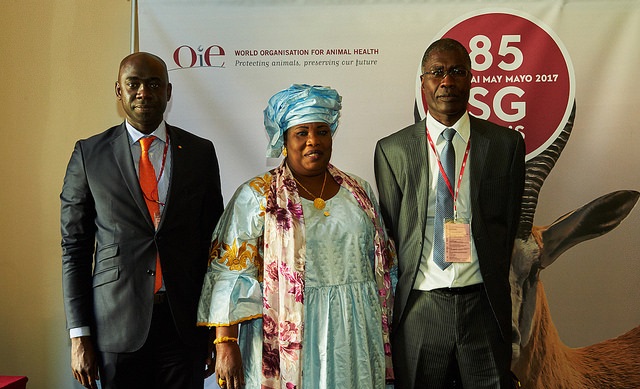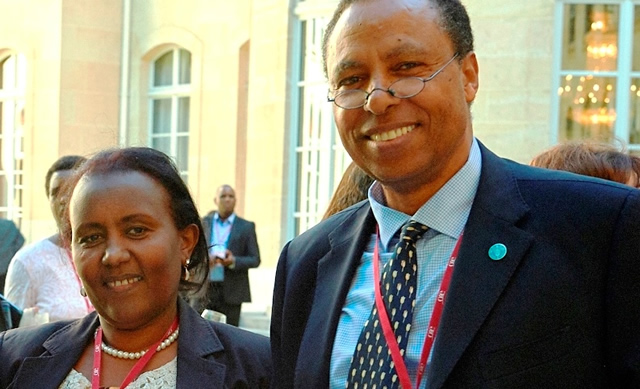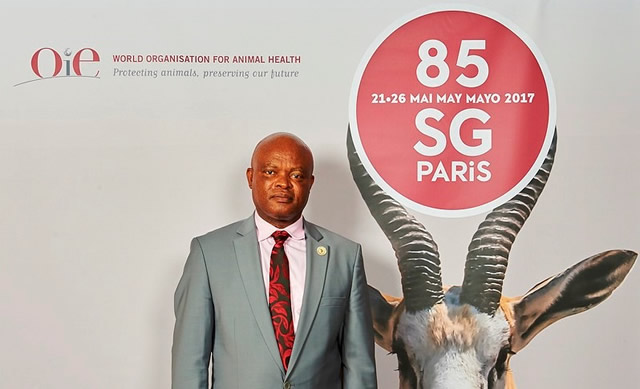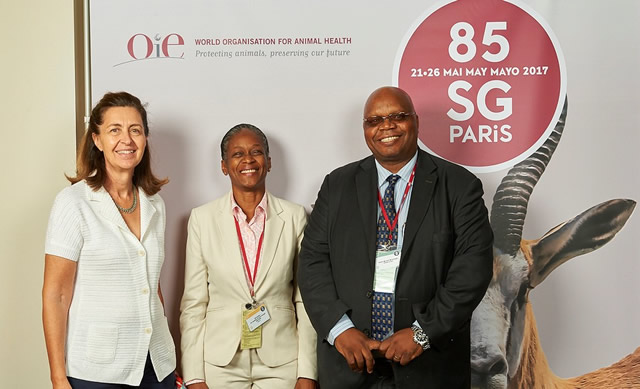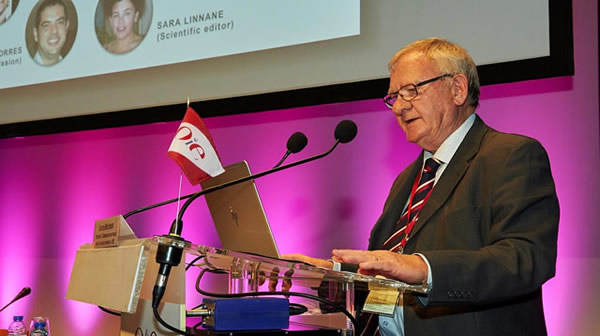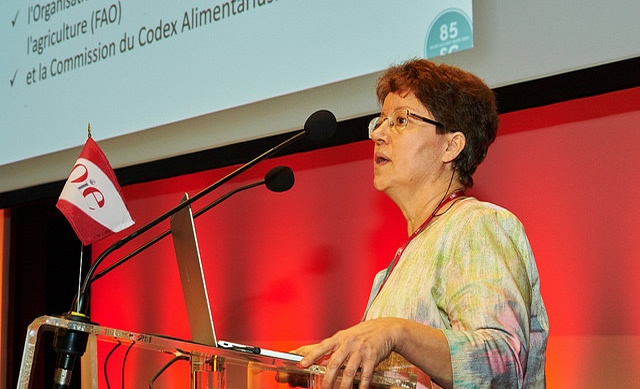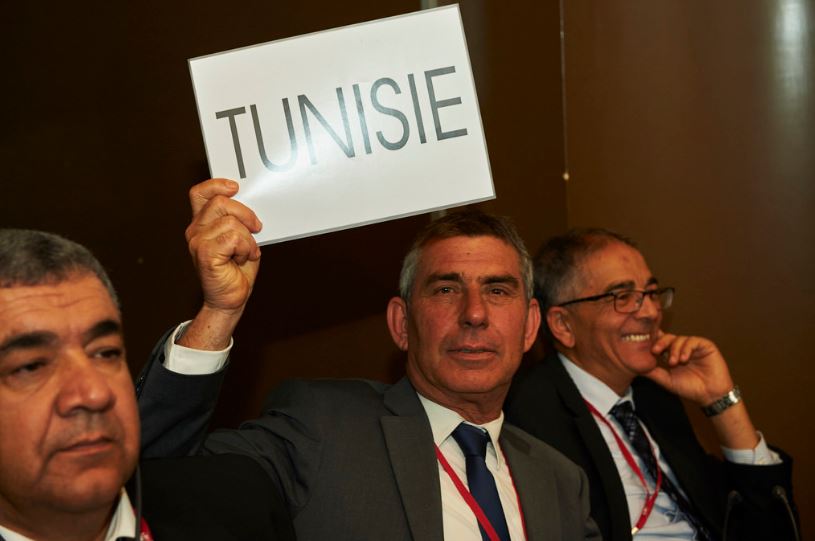
About 850 participants, representing 140 national Delegations from among the 180 Member Countries of the OIE (of which 40 were from Africa) and from some 40 international, intergovernmental, regional and national organisations participated in the event. The opening ceremony was held in the presence of several ministers and members of government of OIE Member Countries, as well as the President of the OIE, Dr Botlhe Michael Modisane, and the Director General of the OIE, Dr Monique Eloit.
85 GS Senegal
The Delegation from the Republic of Senegal: Dr. Pape Fall (Prime Minister’s Office), H.E. Aminata Mbengue Ndiaye, Minister of Animal Husbandry and Animal Productions and Dr Mbargou Lô, Director of Veterinary Services and OIE Delegate.
.
Numerous distinguished guests delivered speeches at the opening ceremony and – among them – there were ministers and high representatives from Africa such as H.E. Mrs Josefa Sacko, the new Commissioner for Rural Economy and Agriculture of the African Union Commission, H.E. Mrs Luisa Celma Meque, Vice Minister of Agriculture and Food Security of Mozambique, H.E. Mrs Aminata Mbengue Ndiaye, Minister of Livestock and Animal Productions of Senegal, H.E. Mrs. Valma Vall Mint Soueina, Minister of Animal Husbandry of Mauritania and Mr Andrew K. Tuimur (Principal Secretary for Ministry of Agriculture, Livestock and Fisheries of Kenya).
The President of the OIE, Dr Botlhe Michael Modisane presented OIE Honorary Awards to members of the veterinary community for outstanding services to veterinary science and to the OIE. The recipient of the OIE Meriterious award (medal) is Dr. Walter Masiga who, in his acceptance speech stated that he would “… forever remember with fondness all those colleagues that have crossed (his) path professionally, and amicably, during all these years”. Dr. Masiga retired from the OIE in December 2016 as Sub-Regional Representative for Eastern Africa, a position he had held since 2010.
The rapporteur for this technical item, Ms Khadija Id Sidi Yahia of the Moroccan National Food Safety Agency (ONSSA), made the presentation. The report presented an accurate descriptive analysis by region based on the answers received from OIE Members to a questionnaire that had been submitted to them as well as several recommendations aiming – among others – at continuing to support the actions within the framework of the WHO Global Action Plan on antimicrobial resistance (AMR) endorsed in May 2016.
The Africa region fully supported the recommendations especially those referring to encourage and reinforce the inter-sectoral collaboration and that related to the national legislation that should require veterinary prescription before delivery the antibiotics. An OIE Resolution outlining the recommendations was presented and adopted by the World Assembly of Delegates of OIE on 25 May 2016.
85 GS Berhe Tekola Mesrak Mekonnen
OIE Delegate and State Minister of Veterinary Services and Feed Control, of the Ministry of Livestock and Fisheries of Ethiopia, Dr. Mesrak Mokonnen Yetneberk (left) and the current Director of the FAO Division of Animal Health and Production (AGA) and former OIE Delegate of Ethiopia, Dr. Berhe Gebreegziabher Tekola (right)
The topic, presented by Dr Samuel Thevasagayam (Bill & Melinda Gates Foundation) focussed on the benefits of Public-Private Partnerships (PPPs), based on several successful examples of PPPs in Africa and Asia. Given the scarcity of resources and capacities within the public or private sectors of Veterinary Services, Public-Private Partnerships (PPPs) offer tangible and timely support to address this complex environment and fulfil today’s societal demands.
Poultry production in Ethiopia was used as a case study; through a partnership between the Government of Ethiopia, EthioChicken (a private entity) and the Bill & Melinda Gates Foundation, benefits of such PPP were highlighted, e.g. the Government hatchery that once produced 40,000 day-old-chicks per year is today producing over 100,000 day-old-chicks per week.
The African countries, in their comments, supported the PPPs initiatives in ensuring the sustainability of Veterinary Services and underlined the importance of facilitating PPPs with enabling legislation and good veterinary governance. A Resolution in this respect – by outlining several recommendations – was adopted by the World Assembly of Delegates.
A total of 113 persons participated in the meeting of the Regional Commission for Africa on 22 May (Monday) representing countries (36 out of the 54 Member Countries), regional and international organizations (AVA, AVEA, AVSF, CIRAD, AU-IBAR, AU-PANVAC, AU-PATTEC, ECCAS, FAO, IGAD, the Indian Ocean Commission (IOC), WAEMU (UEMOA) and the World Bank).
The report of the President of the OIE Regional Commission for Africa was presented by Dr. Komla Daniel Batawui, Delegate of Togo and President of the Regional Commission. Dr Moetapele Letshwenyo, OIE Sub-Regional Representative for Southern Africa, on behalf of all OIE Representatives in the region, provided participants with further details on the OIE Regional Roadmap and its development, and the challenges that the region faces. Dr Samuel Wakhusama, OIE Sub-Regional Representative for Eastern Africa, gave an update on the implementation of the “Strengthening Veterinary Services in Developing Countries + Rabies Control” (SVSDC + R) project.
“The PVS Pathway as an advocacy tool for increased investment in Veterinary Services in Africa” was selected as a technical item (with questionnaire) for the 23rd Conference of the OIE Regional Commission for Africa.
“Adoption of the ‘One Health’ approach as an unavoidable path for the prevention and control of emerging and re-emerging diseases” was proposed for inclusion in the agenda of the 87th General Session (with questionnaire to Members).
85 GS Nick Nwankpa PANVAC
Dr. Nick Nwankpa, Director of the African Union Pan-African Veterinary Vaccine Centre (AU-PANVAC) in Ethiopia, an OIE Collaborating Centre and FAO/OIE Rinderpest Holding Facility.
With regard to vacant positions, and following a discussion between the Delegates, Dr Kamal Tag El-Sir El Sheikh, Delegate of Sudan, was unanimously nominated as a Member of the Council of the OIE. As for the Regional Commission, Dr. Djamila Hadj Amar, Delegate of Algeria, was putt forward as Vice-President and Dr. Mahamat Guindé, Delegate of Chad, as Secretary-General. These positions were endorsed by the World Assembly during its Friday morning administrative session.
Other topics were discussed as well, such as an update on the organisation of the 23rd Conference of the OIE Regional Commission for Africa, to be held in Yaounde, Cameroon in February 2019.
Through sustained commitments, several countries improved or gained official disease status recognitions or endorsement of official control programmes. The OIE World Assembly issued certificates to the African countries of :
A major breakthrough from the perspective of African countries is the appeal made by the President of the Scientific Committee for Animal Diseases, Dr. Gideon Brückner, to start a reflection on the way forward for the official status regarding Bovine Spongiform Encephalopathy (BSE), in a context of dwindling number of cases (apart from the atypical cases, not covered by the status). Short of outright delisting the disease (as proposed by some Member Countries) the official status procedure could be withdrawn, to be replaced by the usual self-declaration procedure. Several Member Countries have urged the relevant OIE Specialist Commissions to start revising the Code chapter on BSE. To be continued….
85 GS Modisane Santana Angola
The OIE Director General, Dr Monique Eloit (left) with the new OIE Delegate for Angola, Dr Bernadette Santana (centre) and the OIE President and Delegate of South Africa, Dr Botlhe Michael Modisane.
New international standards and guidelines were presented – by the relevant Specialist Commissions – during the General Session.
A number of new and revised texts for the Aquatic Code and Aquatic Manual were adopted during the 85th General Session. These included the addition of a new listed amphibian disease, Batrachochytrium salamandrivorans; and the introduction of a new chapter on acute hepatopancreatic necrosis disease (AHPND, crustaceans) in both the Aquatic Code and the Aquatic Manual.
In addition, information was provided on an emerging disease, Tilapia Lake Virus, which has been considered for listing by the OIE, but did not meet the criteria as yet, primarily due to diagnostic issues. Countries are nonetheless encouraged to report Tilapia Lake Virus as an emerging (non-listed) disease. A technical fact sheet is now available.
The World Assembly of Delegates adopted five new standards in the fields of terrestrial animal diseases prevention and control:
The OIE Delegates also adopted 12 revised texts in the fields of terrestrial animal disease prevention and control. Particularly, the chapter related to lumpy skin disease (Chapter 11.11.) was comprehensively revised to reflect the current disease outbreak situations and provide the appropriate risk management options. A major review was also made for the chapter on African swine fever virus (Chapter 15.1.). Some provisions of the proposed revised text were vehemently objected to by some countries, in particular on the possibility to continue trade of commodities derived from domestic or captive wild pigs, whilst reporting ASF in wild and feral pig population. The text was eventually adopted with two countries voting against, whilst promising to revise the provisions as new scientific information becomes available.
The OIE also pays a continuous attention to animal welfare improvement. The standards adopted in 2015 on animal welfare and dairy cattle production systems (Chapter 7.11.) and in 2016 on welfare of working equids (Chapter 7.12.) were revised. New work is currently in progress on standards for pig production systems and the slaughter and killing of farmed reptiles for skins and meat.
85 GS Gideon Bruckner
President of the OIE Scientific Commission for Animal Diseases, Dr. Gideon Brückner (South Africa).
Two resolutions were submitted to, and approved by, the World Assembly, discontinuing the mandate of two out of the three (statutory and permanent) Working Groups, the one on Animal Production Food Safety and the one on Animal Welfare. These Groups will therefore disappear, having successfully attained their objectives.
The abolishment of the Animal Welfare Working Groups also fits with the implementation of the Global Animal Welfare Strategy, which foresees the establishment of an OIE Global Animal Welfare Forum. The only remaining Working Group with a work plan for 2017 – 2018 is therefore the one for Wildlife.
In terms of governance of the Organisation, the Delegates voted, by comfortable majority vote, for a considerable increase in the OIE budget, which will have to be financed by a corresponding increase in statutory contributions to the Organisation from 2018 onwards.
The Delegates also approved the accession of the OIE Territory of Curacao, semi-autonomous territory of the Kingdom of the Netherlands, in the Caribbean, as the 181st Member.
85 GS
Keynote speaker for the Technical Item n° 1 (with questionnaire), Dr Khadija Id Sidi Yahia of the Moroccan National Food Safety Agency (ONSSA) on antimicrobial resistance.
All pictures © Isabelle Zezima (oie) 2017, unless mentioned otherwise

